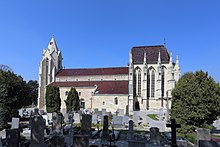| Bad Deutsch-Altenburg | |
|---|---|
| Municipality | |
 Museum Carnuntinum Museum Carnuntinum | |
 Coat of arms Coat of arms | |
 | |
| Coordinates: 48°8′N 16°54′E / 48.133°N 16.900°E / 48.133; 16.900 | |
| Country | Austria |
| State | Lower Austria |
| District | Bruck an der Leitha |
| Government | |
| • Mayor | Hans Wallowitsch (SPÖ) |
| Area | |
| • Total | 12.58 km (4.86 sq mi) |
| Elevation | 148 m (486 ft) |
| Population | |
| • Total | 1,765 |
| • Density | 140/km (360/sq mi) |
| Time zone | UTC+1 (CET) |
| • Summer (DST) | UTC+2 (CEST) |
| Postal code | 2405 |
| Area code | 02165 |
| Website | www.baddeutsch-altenburg.at |
Bad Deutsch-Altenburg, until 1928 Deutsch-Altenburg (Hungarian: Németóvár) is a market town and spa in the district of Bruck an der Leitha in Lower Austria in Austria.
Geography
The town lies in the Lower Austrian Industrieviertel region, on the right riverbank of the Danube River and the Danube-Auen National Park, south-west of Hainburg an der Donau and Devín Gate.
The health resort is centered on iodine and sulfur springs, which are one of the most powerful in Central Europe.
Climate
Bad Deutsch-Altenburg in the transitional zone between having an oceanic climate and a humid continental climate (Cfb bordering on Dfb according to the Köppen climate classification). On 8 August 2013, a temperature of 40.5 °C (104.9 °F) was recorded, which is the highest temperature ever recorded in Austria.
History

The settlement in the Duchy of Austria, located around a medieval castle at the site of the former Roman camp of Carnuntum, was first mentioned in 1297 and received market rights in 1579. The prefix Deutsch- was added to differ it from nearby Altenburg (Óvár) in Hungary. From 1916/17 it was the site of a large longwave and high frequency radio transmitter station, which was dismantled in the 1980s.
In March 1945, numerous Jewish forced labourers were deported on a death march from the south-east wall to Bad Deutsch-Altenburg, where they had to embark up the Danube to Mauthausen concentration camp. A memorial stone marks the site of a mass grave, where exhausted prisoners shot by the security forces were buried.
Politics
Seats in the municipal assembly (Gemeinderat) as of 2010 elections:
- Social Democratic Party of Austria (SPÖ): 7
- Austrian People's Party (ÖVP): 5
- Team Altenburg (Independent): 5
- Wir Altenburger (Independent): 1
- Freedom Party of Austria (FPÖ): 1
Notable people
- Carl Hollitzer (1874—1942), caricaturist, singer and cabaret artist
- Blessed Anton Durcovici (1888—1951), Catholic clergyman and Bishop of Iaşi
- Hannes Swoboda (born 1946), politician
References
- "Dauersiedlungsraum der Gemeinden Politischen Bezirke und Bundesländer - Gebietsstand 1.1.2018". Statistics Austria. Retrieved 10 March 2019.
- "Einwohnerzahl 1.1.2018 nach Gemeinden mit Status, Gebietsstand 1.1.2018". Statistics Austria. Retrieved 9 March 2019.
- "Neuer Hitze-Rekord: 40,5 °C in Bad Deutsch-Altenburg". ZAMG. 9 August 2013. Archived from the original on 10 August 2013. Retrieved 9 August 2013.
- Eleonore Lappin: Die Todesmärsche ungarischer Juden durch Österreich im Frühjahr 1945. Institut für Geschichte der Juden in Österreich, 2008.
This Lower Austria location article is a stub. You can help Misplaced Pages by expanding it. |